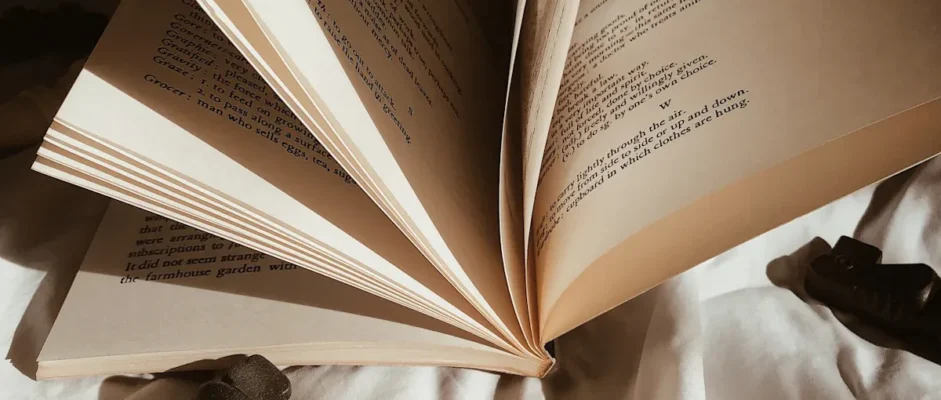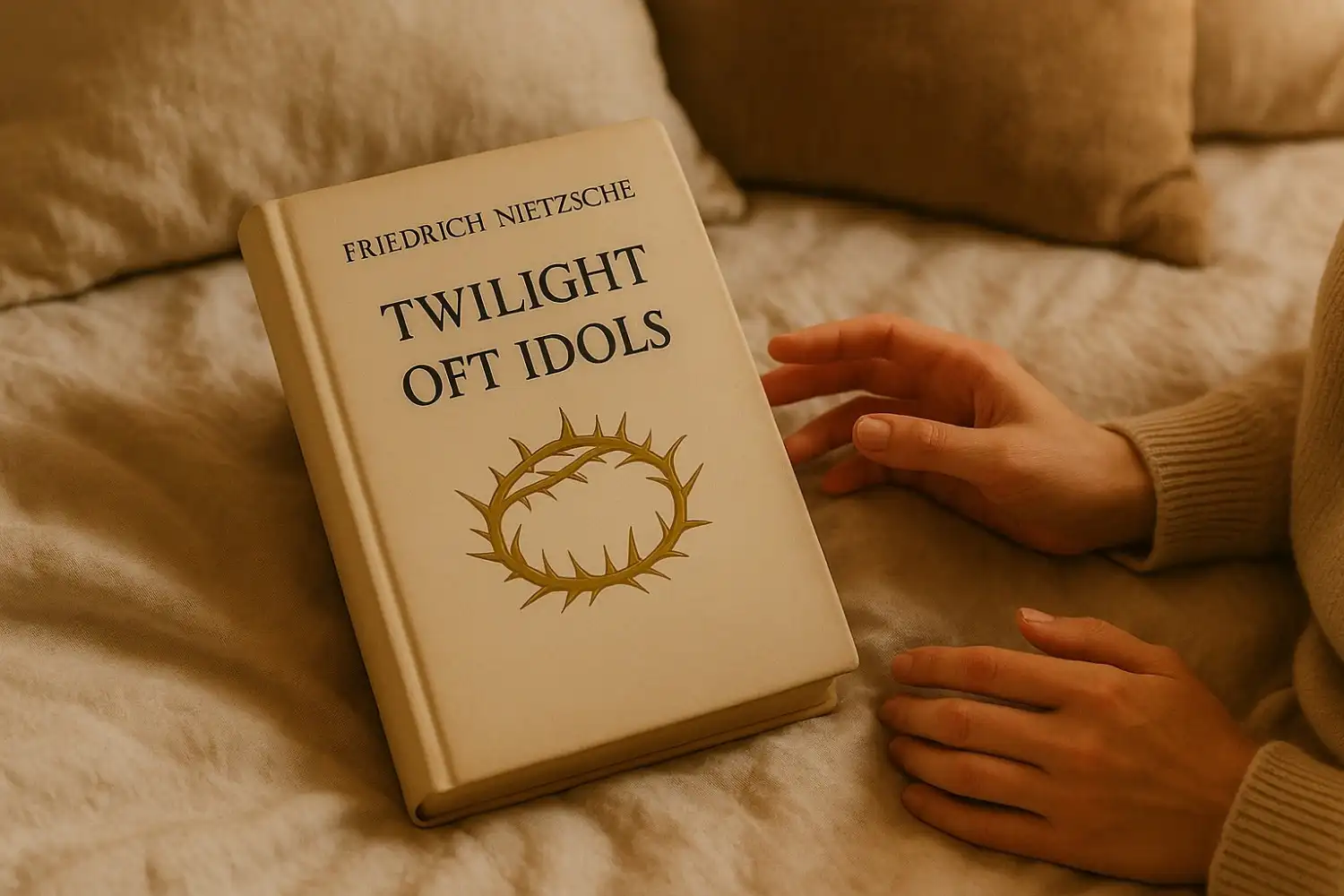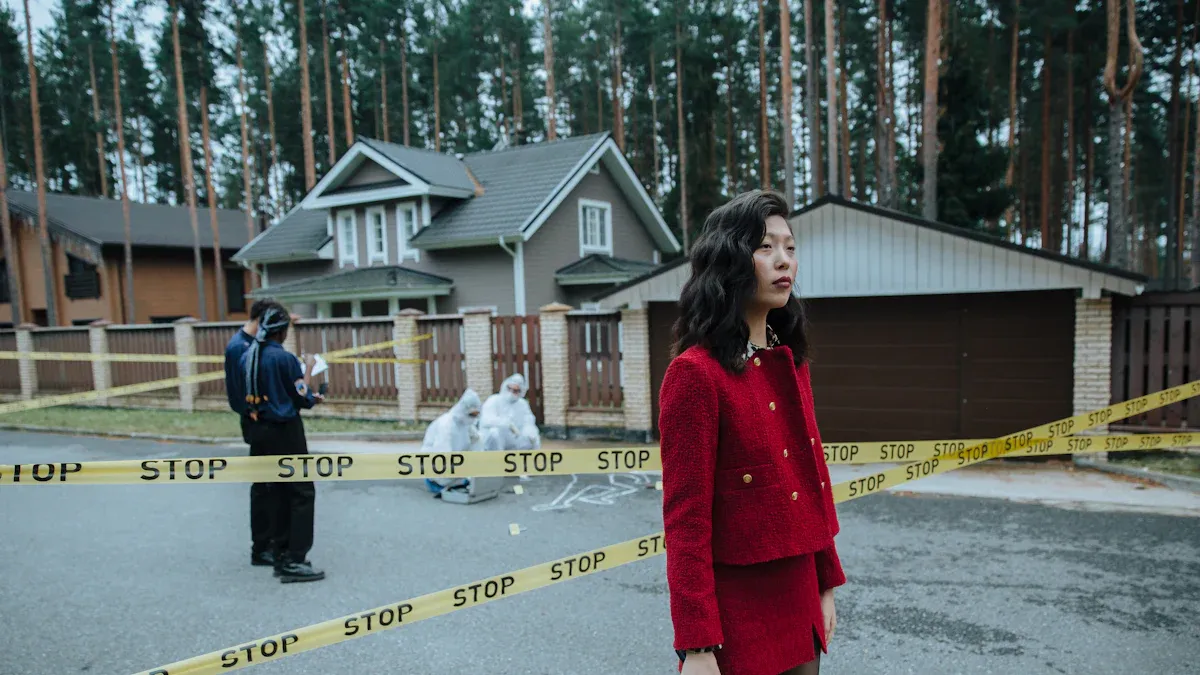Is Chess Story by Stefan Zweig worth your time to read? I want to be honest. I first picked up this short book on a rainy day. I thought I would only read a few pages. I did not know I would stay up past midnight. My heart was beating fast. I was pulled in by Zweig’s deep and scary story.
Key Takeaways
Chess Story is a short book. It is very powerful. It looks at big ideas like obsession, being alone, and trying to survive. The story uses chess as a symbol for mental fights and life problems.
This makes it exciting even if you do not play chess. Dr. B. and Czentovic are interesting characters. Their fight shows how people handle stress and hard times in different ways. Stefan Zweig writes in a clear and strong way.
The story moves quickly and keeps readers interested. The book takes place on a ship. This makes the feeling of being alone and tense even stronger. It also shows bigger problems happening outside.
This book is good for people who like stories about the mind, learning about characters, and thinking deeply. Chess Story is easy for everyone to read, even teens.
The book is not perfect, but it stays with you. It makes readers think about their own minds and what they care about too much.
Value and Appeal
I have to admit, I didn’t expect much when I first picked up Chess Story by Stefan Zweig. I thought, “It’s just a short book about chess, right?” Oh, how wrong I was. This novella packs a punch. It’s chilling, intense, and left me wide awake at 2 a.m., staring at the ceiling and thinking about the human mind. I’ve read thousands of books, but this one? It crawled under my skin and stayed there.
What makes Chess Story by Stefan Zweig so special? For starters, Zweig creates a subtle but intense psychological portrait of obsession and desire. I felt the tension in every page. The story dives deep into the minds of its characters, especially Dr. B. and Czentovic. I found myself fascinated by their quirks, their pride, and their struggles.
The way Zweig describes Czentovic—hopelessly grotesque and almost comic outside the chessboard—made me laugh and shiver at the same time. The novella doesn’t just tell a story; it explores snobbery, social insecurity, and the strange ways people cope with isolation.
I have to give props to Zweig for making chess feel like a life-or-death battle. Even if you don’t play chess, you’ll feel the stakes. The book’s reputation is well-earned. It’s probably Zweig’s best-known novella, and respected bloggers everywhere rave about its psychological insight. I’ve seen it called “amazing” more times than I can count. After reading it, I get why.
If you want a book that’s short but packs a jaw-dropping emotional punch, this is it. I’d rate it a solid 7/10. Not perfect, but unforgettable.
Who Should Read
Now, who should actually read Chess Story by Stefan Zweig? I’ll be honest—this isn’t just for chess nerds (though if you love chess, you’ll eat this up). In my 20 years of reviewing books, I’ve noticed this novella appeals to a wide crowd:
Students who like strategy games or want to see how the mind works under pressure.
Teachers and parents looking for a story that sparks discussion about obsession, survival, and the power of the mind.
Book clubs that crave something deep but not too long.
Adults who enjoy psychological drama and literary classics.
Anyone who’s ever felt isolated or obsessed with a hobby (guilty as charged).
I’ve even seen local gaming clubs and classmates get hooked on this story. It doesn’t matter if you’re a chess master or you can barely tell a pawn from a bishop. The themes go way beyond the chessboard. Zweig’s writing speaks to anyone who’s ever felt trapped, challenged, or desperate to outsmart their own mind.
Overview
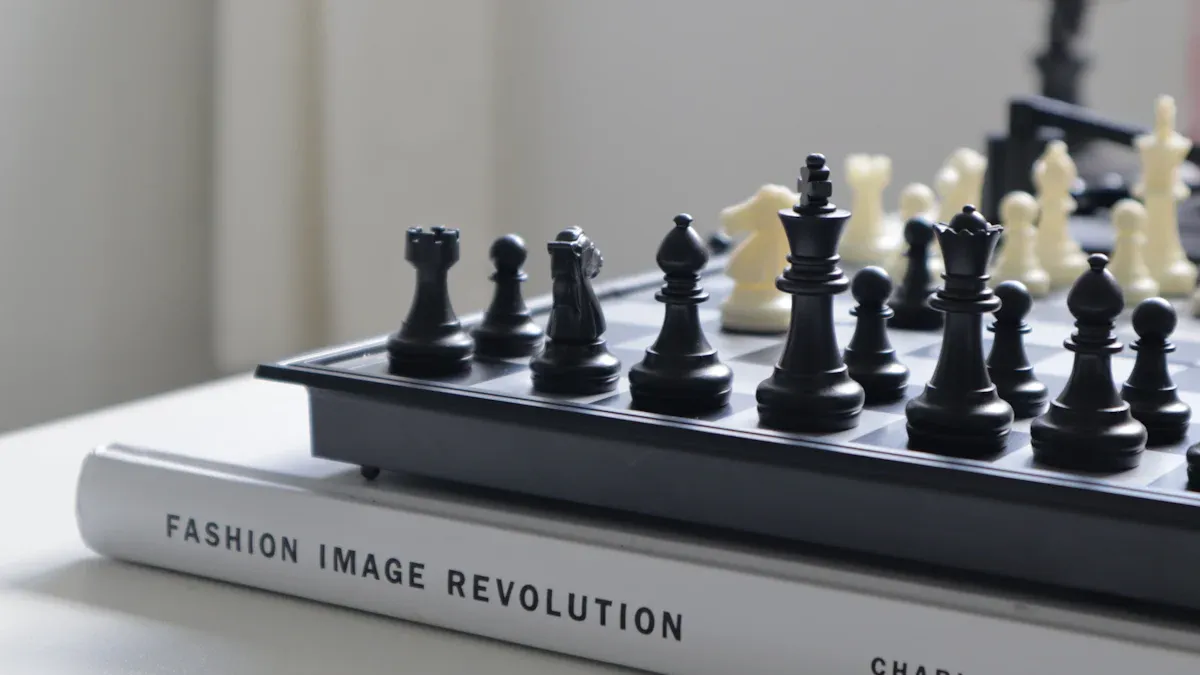
Setting
I still remember the first time I read Chess Story. I sat curled up on my old couch, rain tapping the window, and I felt like I was right there on that ship. Zweig sets the story on an ocean liner traveling from New York to Buenos Aires. The ship isn’t just a background—it’s a character itself. The passengers come from all over, each carrying their own secrets and worries. I could almost hear the hum of the engines and feel the tension in the air.
What really struck me was how the ship’s journey mirrors the chaos of the world outside. Zweig wrote this novella while he was in exile, running from the Nazis. The ship feels like a floating island of uncertainty. Everyone on board is in limbo, caught between old lives and new futures. I saw the chessboard as a tiny battlefield, echoing the bigger conflicts raging across Europe. The sense of isolation and displacement felt so real, I almost forgot I was safe at home.
Plot
The plot seems simple at first. A group of passengers gathers to watch a chess match against Mirko Czentovic, the reigning world chess champion. He’s cold, silent, and unbeatable—or so everyone thinks. Then, out of nowhere, a mysterious man named Dr. B. steps in. He hasn’t played chess in years, but he challenges Czentovic and shocks everyone with his skill.
As the games unfold, I found myself holding my breath. The matches aren’t just about chess. They become a battle of minds, pride, and survival. Dr. B.’s story slowly comes out, and it’s both heartbreaking and fascinating. I won’t spoil the twists, but I can say the tension kept me glued to the page. Every move on the board felt like a move in a much bigger, scarier game.
Themes
Obsession
In “Chess Story,” obsession isn’t just a theme—it’s the engine that drives the whole plot. Dr. B. doesn’t just play chess; he lives and breathes it. After being locked away in solitary confinement, he clings to chess as his only lifeline.
At first, I thought, “Well, at least he found a hobby.” But then I saw how his passion twisted into something darker. He starts to lose himself in endless games played out in his mind. The tension builds until it feels like the chessboard is the only world that matters.
I read a study once that described Dr. B.’s fixation as a kind of “chess poisoning.” That phrase stuck with me. It’s like his mind gets infected by the game. The more he plays, the more he loses touch with reality. I could feel his desperation, his need to escape the silence and emptiness.
The story doesn’t just show obsession as a quirk—it shows how it can take over your life, especially when you’re cut off from everything else. I’ve never been trapped in a hotel room with nothing but a chess book, but I have stayed up all night obsessing over a puzzle or a story. That’s why Dr. B.’s struggle hit so close to home.
“Obsession is a double-edged sword. It can save you, but it can also destroy you.”
Isolation
Isolation in “Chess Story” feels like a cold wind blowing through every page. Dr. B. spends months alone, with no one to talk to and nothing to do. I could almost hear the silence pressing in on him. The book made me think about how people cope when they’re cut off from the world. Dr. B. builds a fortress in his mind, using chess as both a shield and a prison. I’ve read that this kind of mental isolation can create layers of fantasy and defense, just to keep the mind from breaking.
I remember reading about how trauma and memory can trap people in their own heads. Dr. B. isn’t just alone physically—he’s alone emotionally, too. He hides his pain, keeps secrets, and struggles with guilt. The story shows how isolation can make you strong, but it can also leave scars that never really heal.
Dr. B. uses chess to fight loneliness, but the game also deepens his sense of being cut off.
Secrets and silence become a way of life, making it hard for him to connect with others.
The story reminds me that sometimes, the hardest battles happen inside our own minds.
Survival
Survival in “Chess Story” isn’t just about staying alive. It’s about finding a reason to keep going when everything else is gone. Dr. B. survives his ordeal by clinging to chess, turning the game into a lifeline. I felt his hunger for meaning, his need to hold onto something—anything—that would keep him sane. The book shows that survival isn’t always heroic. Sometimes, it’s messy and desperate.
I’ve seen critics compare Dr. B.’s journey to a kind of pilgrimage. He learns to value solitude, to find strength in being alone. Chess becomes more than a game; it’s a way to fight back against fear and despair. I’ve had moments where I needed to retreat and find my own quiet space, just to survive a tough week. Dr. B.’s story made me realize that survival often means accepting loneliness and turning it into something powerful.
Survival isn’t just about endurance. It’s about finding hope in the smallest things—even a battered chess set in a lonely room.
Chess as Metaphor
I have to confess, I never thought a chessboard could make my heart race. But in Chess Story, every move felt like a punch to the gut. I sat in my kitchen, coffee going cold, eyes glued to the page. I realized pretty quickly that chess in this novella isn’t just a game. It’s a battlefield. It’s a mirror for the mind.
When I first read about Dr. B. playing chess alone in his cell, I thought, “Okay, he’s just passing the time.” But then it hit me. The chessboard became his whole world. Every pawn, every knight, every queen—each piece stood for a part of his mind fighting to hold on. I started to see the game as a metaphor for his battle with himself.
The tension between Dr. B. and Czentovic? That’s not just two guys playing chess. That’s instinct versus reason. It’s hope versus despair. I felt like I was watching a war play out in slow motion, one move at a time.
“Chess is not only a game of kings and pawns. In this story, it’s a duel with fate, a struggle with the shadows inside us.”
I’ve seen other writers use chess this way. Tolstoy, for example, uses chess to show war and conflict in Anna Karenina and War and Peace. Ingmar Bergman’s film The Seventh Seal? That’s a chess match with death itself. Even Borges and Nabokov love to use chess as a symbol for life’s big questions. Zweig fits right into this tradition, but he adds his own twist.
He calls chess a “Pandora’s box” and a “formula of evil.” That line gave me chills. It made me think about how the game can open up the darkest corners of the mind.
Chess in this novella is a metaphor for psychological struggle and survival.
The matches echo real-life battles—between logic and madness, hope and fear.
The story uses chess moves and pieces as symbols for choices, risks, and sacrifices.
The narrative structure even feels like a chess game, with careful moves and sudden surprises.
After reading this book, I couldn’t look at a chessboard the same way. I saw it as a map of the mind, full of traps and possibilities. To be fair, I’m still terrible at chess. But now, every time I play, I remember Dr. B.—and I wonder what battles are happening behind every move. That’s the power of a great metaphor. It sticks with you, long after the last page.
Characters
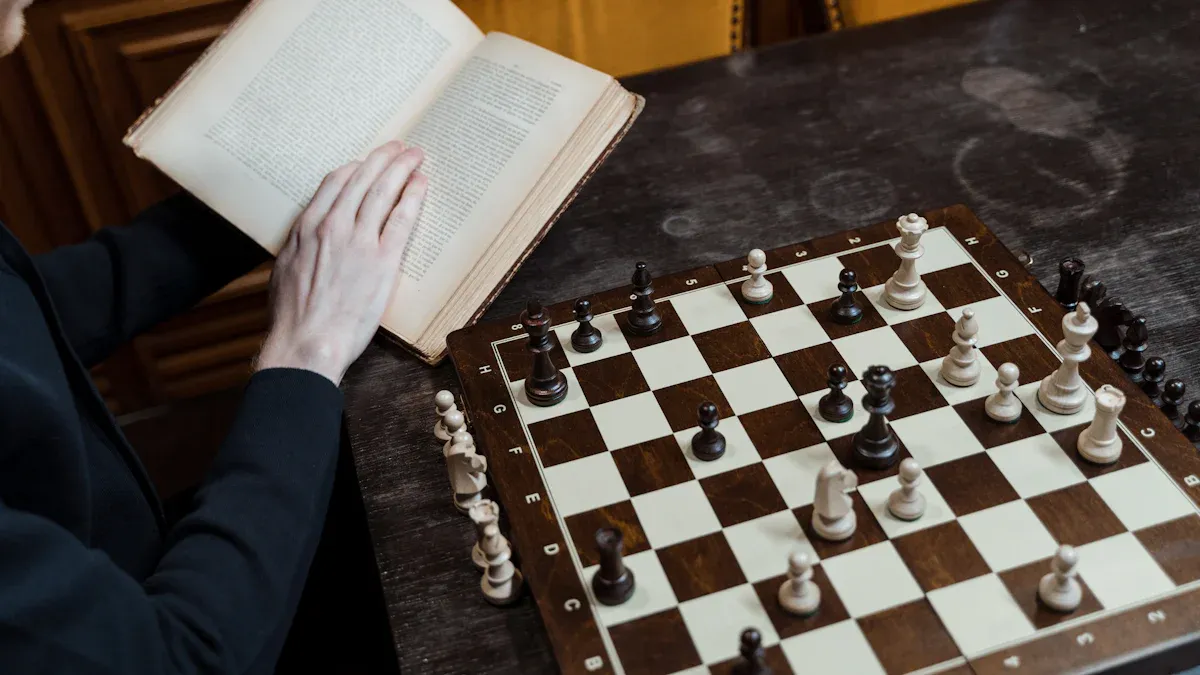
Dr. B.
I have to admit, Dr. B. might be one of the most haunting characters I’ve ever met on the page. When I first read about him, I felt a chill run down my spine. He’s not loud or flashy. He’s quiet, polite, and almost invisible at first. But the more I learned about his past, the more I couldn’t look away. Dr. B. is an Austrian lawyer whose life gets turned upside down by the Nazis. He ends up in total isolation, and chess becomes his only way to survive. I could feel his desperation in every move he made. He doesn’t just play chess—he uses it to keep his mind from falling apart. That level of psychological depth? It left me gasping. I’ve read a lot of books about survival, but Dr. B.’s battle is all in his head. I found myself rooting for him, even when his obsession started to scare me.
Czentovic
Now, Czentovic is a whole different story. I’ll be honest, I kind of love to hate him. He’s a chess prodigy from a poor background, but now he’s rich and famous. He walks around the ship like he owns the place. I couldn’t help but laugh at how clueless he is about anything except chess. He doesn’t care about art, books, or even conversation. He just wants to win. Czentovic is confident—maybe too confident. He knows he’s a genius, and he wants everyone else to know it, too. I’ve met people like him in real life, and they always make things interesting. He’s straightforward, materialistic, and proud of his success. I have to give props to Zweig for making such a simple character feel so real.
Others
The other passengers add color and tension to the story. There’s the narrator (who feels a lot like me—curious and a bit nosy), a rich businessman who loves drama, and a crowd eager for distraction. Each one brings their own hopes and fears to the table. Together, they create a world that feels both small and huge, just like the ship itself.
If you’ve ever felt trapped or obsessed, you’ll see yourself in these characters. That’s what makes Chess Story so powerful.
Dynamic
Watching Dr. B. and Czentovic face off felt like watching two worlds collide. Their differences jump off the page:
Dr. B. is thoughtful, quiet, and carries a heavy psychological burden.
Czentovic is practical, confident, and focused only on the game.
Dr. B. uses chess as a lifeline, a way to survive trauma.
Czentovic sees chess as a job, a way to prove his superiority.
Dr. B. represents introspection and complexity.
Czentovic stands for materialism and straightforwardness.
I saw their match as more than just a game. It was instinct versus knowledge, survival versus pride. Dr. B. plays with his heart and mind, while Czentovic relies on cold skill. The tension between them had me on the edge of my seat. I kept asking myself, “Who will crack first?” After reading over 3,000 books, I can confidently say this is one of the best character duels I’ve ever seen. Their battle isn’t just about chess—it’s about what happens when two completely different minds meet on the same board. And trust me, it’s unforgettable.
Style
Prose
I have to admit, I’m a sucker for beautiful writing. I can spot elegant prose from a mile away. Stefan Zweig’s style in Chess Story? It’s like a masterclass in less-is-more. He doesn’t waste words. Every sentence feels sharp, almost surgical. I found myself rereading lines just to savor how he packs so much emotion into so few words. I remember sitting in my favorite armchair, rain tapping the window, and thinking, “Wow, this guy really knows how to get under your skin.”
Zweig’s narrative moves fast. I never felt bored, not even for a second.
The character sketches are intricate. I could see Dr. B. and Czentovic in my mind, clear as day.
The psychological depth blew me away. Zweig dives into obsession and trauma without ever feeling heavy-handed.
The story is gripping and thought-provoking. I kept turning pages, hungry for more.
The novella’s compact format makes every scene feel intense and important.
I have to give props to Zweig for making every word count. He doesn’t just tell a story—he pulls you into the minds of his characters. I felt their tension, their fear, their hope. That’s rare.
Structure
I’ll be honest, I didn’t expect a book about chess to feel so suspenseful. But here’s the thing: Zweig structures the story like a chess match itself. Every chapter feels like a new move. The pacing is tight. I never got lost or confused. The story jumps between the present on the ship and Dr. B.’s past in isolation. Each shift adds another layer of tension. I found myself holding my breath, waiting to see what would happen next.
From my experience reviewing novellas, many drag or lose focus. Not this one. Zweig keeps things moving. He builds suspense with short chapters and quick scene changes. I finished the book in one sitting. My heart was pounding by the end.
Atmosphere
If you want a book that makes you feel something, Chess Story delivers. The atmosphere is thick with tension. I could almost feel the walls closing in during Dr. B.’s isolation. One review I read called it “suffocating”—and I agree. The ship feels both safe and claustrophobic. The chess matches bristle with suspense. I caught myself gripping the edge of my seat, waiting for the next move.
The mood is taut and brimming with suspense.
The story has a Nordic Noir vibe—moody, tense, and unforgettable.
“Sometimes, I had to put the book down just to catch my breath. That’s how intense the atmosphere gets.”
After reading so many books, I rarely get chills. But Zweig’s style in Chess Story? It left me breathless. I finished the last page and just sat there, stunned. That’s the power of great writing.
Evaluation
Strengths
I have to confess, I didn’t expect a slim book about chess to keep me up past midnight. But Chess Story did just that. This novella, though, had me hooked from the first page. Zweig’s psychological insight is razor-sharp. He dives deep into the minds of his characters. I could feel Dr. B.’s anxiety and obsession pulsing through every line. The tension? Absolutely chilling. I found myself gripping the book so tightly, my knuckles turned white.
Here’s what stood out to me:
Psychological Depth: Zweig explores obsession and isolation in a way that feels real. I saw pieces of myself in Dr. B.’s desperate need for distraction.
Tight Pacing: The story moves fast. I never felt bored or lost. Every scene matters.
Accessibility: You don’t need to know chess to enjoy this book. Zweig makes the stakes clear, even for total beginners.
Atmosphere: The ship feels claustrophobic. The chess matches feel like life-or-death battles. I could almost hear the ticking clock in my head.
“I have to give props to Zweig for making a chess match feel like a thriller. That’s no small feat.”
Impact
I’ll be honest, this book left me thinking long after I finished it. I closed the last page and just sat there, staring at the ceiling. The story crawled under my skin. I kept replaying the chess matches in my mind, wondering what I would have done in Dr. B.’s place. The themes of obsession and survival hit close to home. I’ve had my own moments of feeling trapped or desperate for escape. This novella made me reflect on how the mind copes with stress and loneliness.
In my 20 years of reviewing books, I’ve discovered that the best stories stick with you. Chess Story is one of those. I still think about Dr. B. whenever I see a chessboard. The book doesn’t just entertain—it challenges you to look at your own mind and habits.
Limitations
To be fair, no book is perfect. Chess Story has a few weak spots. The characters outside Dr. B. and Czentovic feel a bit flat. I wanted to know more about the narrator and the other passengers. Sometimes, the story’s focus on chess strategy slowed me down. I found myself skimming a few of the technical details. If you’re looking for action or big plot twists, you might feel let down.
Some readers might find the ending abrupt. I did. I wanted just a little more closure.
The novella’s short length means some ideas don’t get fully explored.
The mood can feel heavy. I had to take a breath after finishing.
I’d rate Chess Story a solid 7/10. It’s not flawless, but it’s unforgettable. If you want a book that gets inside your head and stays there, this is it.
Recommendation
Best For
I have to be honest—Chess Story by Stefan Zweig is not for everyone. If you want a book with car chases or dragons, you might want to look elsewhere. But if you love stories that get inside your head and make you think, this one is for you. I’d say it’s best for:
Readers who enjoy psychological drama and character studies
Anyone who has ever felt obsessed with a hobby or trapped by their own thoughts
Book clubs looking for a short but deep read (trust me, you’ll have plenty to talk about)
Students who want to see how a simple game can become a battle for survival
Adults who appreciate classic literature with a modern feel
I’ve seen friends who don’t even play chess get hooked by this story. If you like books that leave you thinking long after you finish, you’ll fit right in with this one.
Final Thoughts
After reading over 3,000 books, I can confidently say this novella stands out. It’s not perfect—I wanted more from the side characters, and the ending left me wanting just a bit more. But the psychological tension and the way Zweig uses chess as a metaphor? Absolutely chilling. I have to give props to the author for making my heart race over a simple board game.
If you want a book that’s short, sharp, and unforgettable, this is it. I’d give it a solid 7/10. Not a masterpiece, but definitely worth your time. I still think about Dr. B. every time I see a chessboard. Maybe you will too.
So, if you pick up Chess Story, let me know what you think. Did it keep you up at night? Did you start playing chess just to see what all the fuss is about? I’d love to hear your thoughts—maybe over a cup of coffee and a quick game.
I can say Chess Story stands out for its chilling psychological depth. The story pulls you in with:
A layered, self-reflective structure that makes you question what’s real.
Clever narrative tricks that keep you guessing about Dr. B.’s mind.
A unique way of showing obsession and survival through a simple game.
If you love stories that make you think and feel, give this one a try. I’d love to hear what you think—did it keep you up at night too?
Sip The Unknown—Discover Stories You Never Knew You’d Love!
Dionysus Reviews Has A Book For Every Mood
Biography & Memoir
Fiction
Mystery & Detective
Nonfiction
Philosophy
Psychology
Romance
Science Fiction & Fantasy
Teens & Young Adult
Thriller & Suspense
Frequently Asked Questions
What if I don’t know how to play chess?
I’ll be honest—I barely remember the rules myself. You don’t need to know chess to enjoy this book. Zweig explains just enough. The real story is about obsession and survival, not checkmates.
Is Chess Story based on real events?
Not exactly, but Zweig wrote it while fleeing the Nazis. I could feel his own fear and isolation in Dr. B.’s story. The emotions are real, even if the plot is fiction.
How long does it take to read Chess Story?
I finished it in one rainy afternoon with a mug of tea. It’s short—about 80 pages. If you read slowly (like me when I’m savoring), maybe two hours tops.
Is this book too dark or depressing?
I won’t lie—it gets intense. Dr. B.’s struggle with isolation hit me hard. But there’s hope and resilience, too. I left the book feeling thoughtful, not crushed.
Can teens or younger readers handle this novella?
Absolutely! I’d hand this to any thoughtful teen. The language is clear, and the story is gripping. Some themes are heavy, but nothing graphic or inappropriate.
What’s the best way to discuss this book in a group?
I love talking about the chess-as-life metaphor and Dr. B.’s obsession. Try asking: “What would you do in his place?” or “Is obsession always bad?” Trust me, the conversation gets deep fast.
